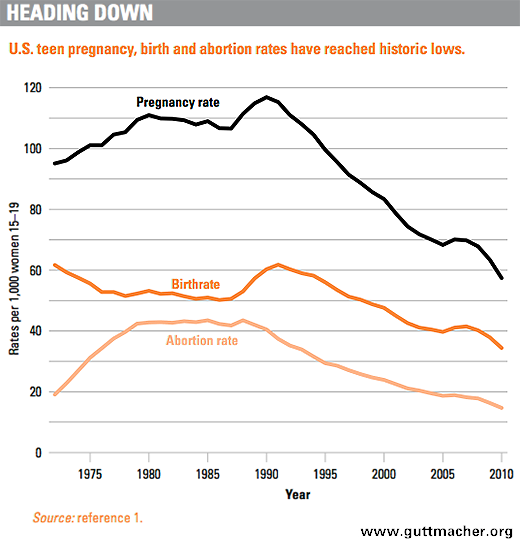Despite All the Panic, Millennial Teens Have Much Less Sex Than Their Elders Did
Congratulations, GenXers: You were better than the millennials at getting laid.


According to popular culture, today's teens are a bunch of "hookup"-scarred heathens, trapped in a sordid world of casual flings with one another and exploitation at the hands of online predators. In reality, teenagers today are having less sex than they have for decades. New data from the Centers for Disease Control and Prevention (CDC) and the National Center for Health Statistics shows that the number of (unmarried) 15- to 19-year-olds who've had sex dropped by 14 percent for girls and 22 percent for boys in the period between 1988 and 2013.
As of 2011-2013, 44 percent of teen girls surveyed and 47 percent of teen boys said they had sexual intercourse—compared to 51 and 60 percent, respectively, of their 1988 counterparts. Or, to put it another way, 4.3 million millennial girls and 4.8 million boys, compared to 5 million and around 6.15 million in the late '80s. Congratulations, last of the Gen X'ers: you are better than the youngest of the millennial cohort at getting laid.
But kids these days are better about practicing safe sex: 79 percent of the girls surveyed and 84 percent of the boys said they had used some sort of contraceptive method the first time they had sex, with condoms ranking the most popular. In 1988, only 71 percent of male teens and 69 percent of female teens used contraception when they first had sex.
After condoms, the birth control pill and the pull-out method are now the most popular teen contraception choices. Fifty-four percent of 15- to 19-year-old girls surveyed said they had at some point been on the pill, which is similar to the 2002 rate; the rates of contraceptive-implant use (2 percent) and intrauterine device, or IUD, use (3 percent) were also relatively stable.
Emergency contraception (EC) use over this period, however, rose significantly: from 8 percent in 2002 to 22 percent in 2011-2013. This coincides, albeit barely, with the Food and Drug Administration's 2013 decision to allow the EC known as "Plan B One-Step" to be sold without a prescription to anyone aged 15 and above. A better explanation is probably found in a general increase in awareness about and acceptance of EC in America over the past decade or so; among all women of childbearing age, the number who had ever used EC rose from 4.2 percent in 2002 to roughly 11 percent by 2010.
Whatever the method, increased contraception usage among teens is paying off. The teen birth, pregnancy, and abortion rates have all fallen precipitiously over the past 25 years, according to the Guttmacher Institute.



Show Comments (120)